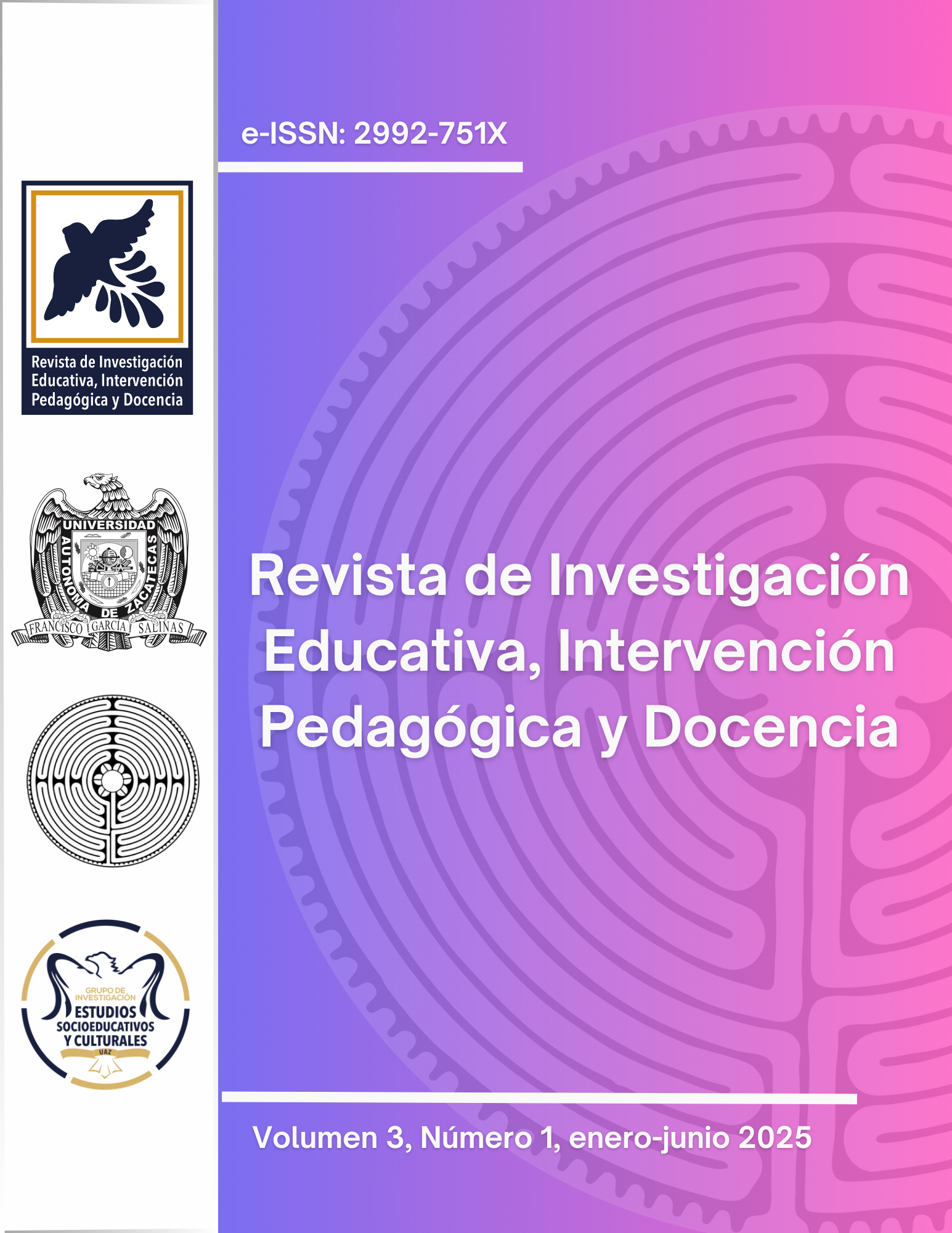Publicado 2025-01-15 — Actualizado el 2025-02-13
Versiones
- 2025-02-13 (2)
- 2025-01-15 (1)
Palabras clave
- aprendizaje,
- lenguas,
- motivación,
- participación
Derechos de autor 2025 Revista de Investigación Educativa, Intervención Pedagógica y Docencia

Esta obra está bajo una licencia internacional Creative Commons Atribución-NoComercial-CompartirIgual 4.0.
Cómo citar
Resumen
El artículo analiza la percepción de los padres y las madres sobre la integración de la gamificación para evaluar el aprendizaje de idiomas en educación primaria. Los resultados muestran una percepción mayormente positiva, destacando que la gamificación aumenta la motivación y participación del estudiantado. Sin embargo, la efectividad en la retención del conocimiento y la participación activa en clase muestra variabilidad. Los padres y las madres también reportan una mayor implicación en la educación de sus hijos e hijas, aunque sugieren mejorar la comunicación sobre la implementación de la Gamificación. Las limitaciones del estudio incluyen una muestra pequeña y la subjetividad de las percepciones. Se recomienda ampliar la investigación y considerar diversas variables contextuales.
Descargas
Referencias
- Aksoy, N., y Usta, E. (2023). Student, teacher, and parent opinions on gamification components used in Educational Information Network (EBA). Journal of Innovative Research in Teacher Education, 4(2), 263–281. https://doi.org/10.29329/jirte.2023.572.6
- Alshammari, M. T. (2020). Evaluation of gamification in e-learning systems for elementary school students. TEM Journal, 9(2), 806-813. https://doi.org/10.1371/journal.pone.0263107
- Blum, R. P. (1983). Emmanuel Levinas' theory of commitment. Philosophy and Phenomenological Research, 44(2), 145-168. https://doi.org/10.2307/2107213
- Bouchrika, I., Harrati, N., Wanick, V., y Wills, G. (2021). Exploring the impact of gamification on student engagement and involvement with e-learning systems. Interactive Learning Environments, 29(8), 1244-1257. https://doi.org/10.1080/10494820.2019.1623267
- Briceño Núñez, C. E. (2022). La gamificación educativa como estrategia para la enseñanza de lenguas extranjeras. ACADEMO Revista De Investigación En Ciencias Sociales Y Humanidades, 9(1), 11–22. Recuperado a partir de https://revistacientifica.uamericana.edu.py/index.php/academo/article/view/601
- Ccoa, N. M. Q., Choquehuanca, M. E. F., y Paucar, F. H. R. (2023). An Application of the Quizizz Gamification Tool to Improve Motivation in the Evaluation of Elementary School Students. Educational Assessment, 2(4), 1-15. https://doi.org/10.18178/ijiet.2023.13.3.1837
- Chaidi, I., y Drigas, A. (2020). Parents' Involvement in the Education of their Children with Autism: Related Research and its Results. International Journal of Emerging Technologies in Learning (iJET), 15(14), 194-203. Kassel, Germany: International Journal of Emerging Technology in Learning. Retrieved February 21, 2024, from https://www.learntechlib.org/p/217577/
- Chen, N. E. (2022). A Description of Game Theory. Journal of Education, Humanities and Social Sciences, 2, 199-205. https://doi.org/10.54097/ehss.v2i.787
- Christopoulos, A., y Mystakidis, S. (2023). Gamification in education. Encyclopedia, 3(4), 1223-1243. https://doi.org/10.3390/encyclopedia3040089
- Gómez-Carrasco, C. J., Monteagudo-Fernández, J., Moreno-Vera, J. R., y Sainz-Gómez, M. (2020). Correction: Evaluation of a gamification and flipped-classroom program used in teacher training: Perception of learning and outcome. PLoS ONE, 15(10), e0241892. https://doi.org/10.1371/journal.pone.0241892
- Hiver, P., Al-Hoorie, A. H., Vitta, J. P., y Wu, J. (2024). Engagement in language learning: A systematic review of 20 years of research methods and definitions. Language Teaching Research, 28(1), 201-230. https://doi.org/10.1177/13621688211001289
- Jayalath, J., y Esichaikul, V. (2022). Gamification to Enhance Motivation and Engagement in Blended eLearning for Technical and Vocational Education and Training. Technology, Knowledge and Learning, 27(1), 91-118. https://doi.org/10.1007/s10758-020-09466-2
- Keaton, W., y Gilbert, A. (2020). Successful Online Learning: What Does Learner Interaction with Peers, Instructors and Parents Look Like? Journal of Online Learning Research, 6(2), 129-154. Waynesville, NC, USA: Association for the Advancement of Computing in Education (AACE). Retrieved February 22, 2024, from https://www.learntechlib.org/primary/p/215616/
- Khasawneh, Y., Khasawneh, N., & Khasawneh, M. (2024). Exploring the long-term effects: Retention and transfer of skills in gamified learning environment. International Journal of Data and Network Science, 8(1), 195-200. https://doi.org/10.5267/j.ijdns.2023.10.004
- López, R., Calvo, J. L., y De la Torre, I. (2022). Teoría de juegos conductual y psicológica: una revisión sistemática. RETOS. Revista de Ciencias de la Administración y Economía, 12(24), 308-328. https://doi.org/10.17163/ret.n24.2022.07
- Loren-Méndez, M., Pinzón-Ayala, D., y Alonso-Jiménez, R. F. (2021). Participación activa del estudiante: gamificación y creatividad como estrategias docentes. Jornadas sobre Innovación Docente en Arquitectura. https://doi.org/10.5821/jida.2021.10595
- Luo, Z. (2022). Gamification for educational purposes: What are the factors contributing to varied effectiveness? Educational Information Technology, 27(3), 891-915. https://doi.org/10.1007/s10639-021-10642-9
- Manzano-León, A., Camacho-Lazarraga, P., Guerrero, M. A., Guerrero-Puerta, L., Aguilar-Parra, J. M., Trigueros, R., y Alias, A. (2021). Between level up and game over: A systematic literature review of gamification in education. Sustainability, 13(4), 2247. https://doi.org/10.3390/su13042247
- Moro, C., y Stromberga, Z. (2020). Enhancing variety through gamified, interactive learning experiences. Medical Education, 54(12), 1180-1181. https://doi.org/10.1111/medu.14251
- Oliveira, W., Hamari, J., Shi, L., et al. (2023). Tailored gamification in education: A literature review and future agenda. Educational Information Technology, 28(2), 373-406. https://doi.org/10.1007/s10639-022-11122-4
- Saleem, A. N., Noori, N. M., y Ozdamli, F. (2022). Gamification Applications in E-learning: A Literature Review. Technology, Knowledge and Learning, 27(1), 139-159. https://doi.org/10.1007/s10758-020-09487-x
- Zeybek, N., y Saygı, E. (2024). Gamification in education: Why, where, when, and how?—a systematic review. Games and Culture, 19(2), 237-264. https://doi.org/10.1177/15554120231158625
- Zourmpakis, A. I., Kalogiannakis, M., y Papadakis, S. (2023). Adaptive gamification in science education: An analysis of the impact of implementation and adapted game elements on students’ motivation. Computers, 12(7), 143. https://doi.org/10.3390/computers12070143


